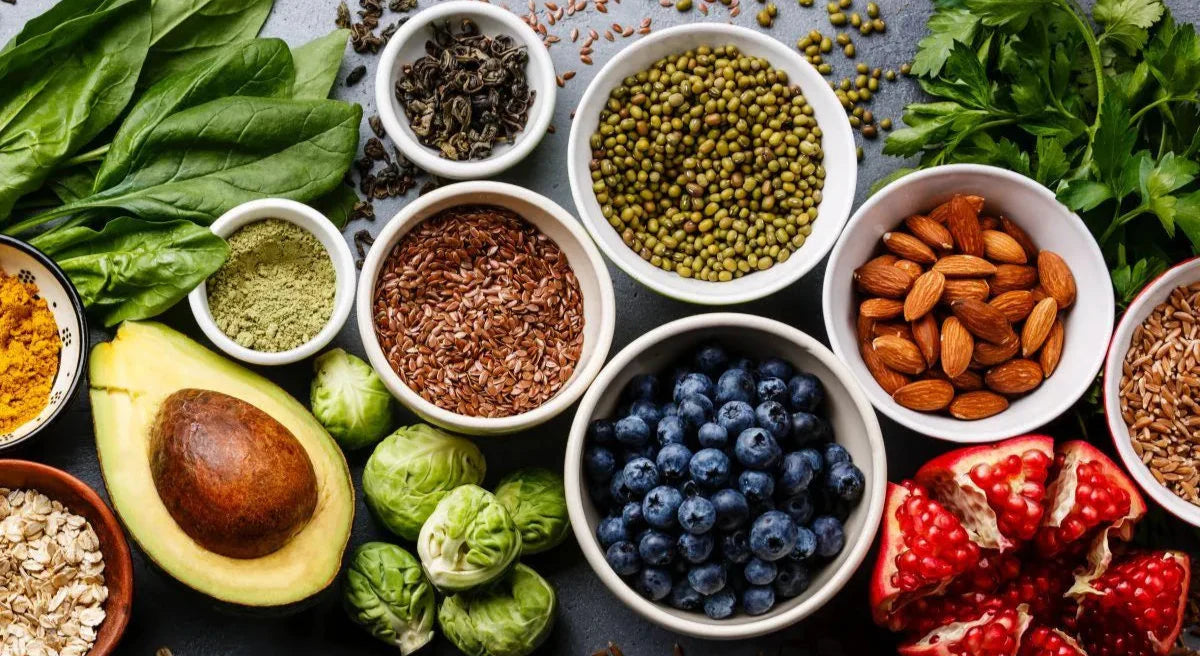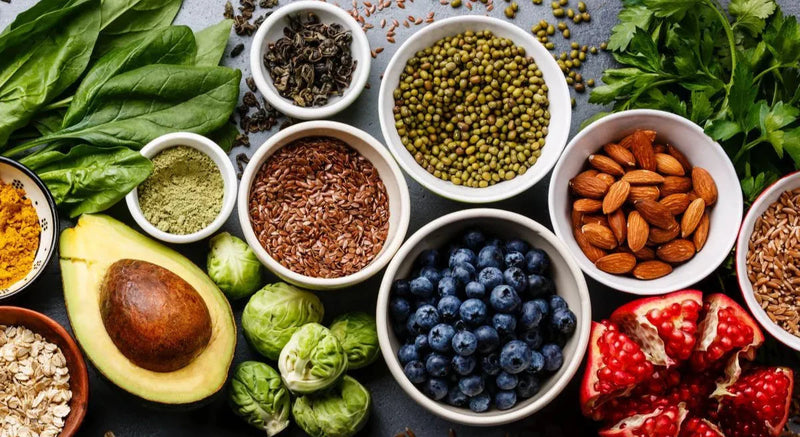Food For The Menopause And Beyond
Well I’m happy to admit that I'm post menopause, not something my mums generation would have done, but it's great that we are able to have much more open conversations about this important and sometimes debilitating time in every womans life.
I haven't taken HRT, instead I've used my knowledge as a Nutritional Therapist to use food and lifestyle to support me and avoid or reduce the symptoms associated with menopause.
I’m not anti HRT, it can be very helpful for some, but not all women are able or want to take it, so I'm sharing my top recommendations for the most beneficial foods and supportive supplements during peri-menopause, menopause and beyond.
My top food recommendations are supportive for everyone even if your taking HRT
Phytoestrogens - help buffer the rollercoaster of oestrogen during peri and menopause and provide a fantastic source post menopause when our ovaries stop production.
These plant-based compounds mimic oestrogen, research suggests that phytoestrogens, particularly isoflavones from soy, can reduce the frequency and severity of hot flashes and night sweats. Since oestrogen is crucial for bone density, phytoestrogens may help reduce the risk of osteoporosis, a condition that becomes more prevalent after menopause.
Studies suggest that soy phytoestrogens may have cholesterol-lowering effects, which could potentially help reduce the risk of cardiovascular disease that increases post menopause.
Research also suggests the possibility of phytoestrogens positively impacting vaginal health, sleep, cognition, and even preventing the growth of breast cancer cells, though more research is needed in these areas.
Find phytoestrogens in tofu, tempeh, edamame, organic soya yogurt, ground linseed / flaxseed (I have 1tbs/day, sprinkle over salads, yogurt, porridge, soups), sesame seeds, berries, dried apricots and dates and cruciferous vegetables.
Eat more plants - I’m not vegan but I think we should all be more vegan! Plants are rich in antioxidants to fight free radical damage, plant compounds support brain function and cognitive health and reduce inflammation all of which have an increased risk factor post menopause.
The vitamins and minerals support bone health reducing risk of osteoporosis which again is at an increase risk post menopause.
A plant-based diet, low in saturated fat and high in fibre, can help manage cholesterol and blood pressure, reducing the risk of heart disease, which increases with menopause. Fibre also supports a healthy gut microbiome. A diverse gut microbiome is linked to better overall health and well-being. Fibre helps with blood sugar balance and keeps us feeling fuller for longer.
Dark green leafy vegetables like spinach and broccoli are good sources of magnesium, which can help improve mood and ease anxiety.
Aim for 30 to 50+ per week: veg, fruit, pulses, legumes, nuts, seeds, gluten free grains, herbs and spices.
Eat Fermented Foods - the probiotics in fermented foods can help alleviate common digestive issues like bloating, constipation, and other GI symptoms experienced during menopause.
A healthy gut microbiome can influence brain function and mood, potentially helping to alleviate mood swings and anxiety, which are common during menopause
Fermented foods, may help reduce inflammation, which can contribute to various menopausal symptoms.
Studies suggest that fermented foods may support hormone balance by influencing the gut microbiome, which can impact oestrogen metabolism.
Try to include fermented foods everyday: Sauerkraut, kefir, live yogurt, kombucha, kimchi, miso
Eat protein rich foods - include protein at every single meal, helps support blood sugar which can also get out of balance due to oestrogen’s role in glucose metabolism. Supports bone health, helps to maintain muscle mass, helps with weight management, and promoting healthy hair, skin, and nails. Collagen is the main protein in skin and sadly it drastically drops during menopause ensuring we are providing the necessary building blocks is crucial.
Protein also helps regulate appetite, boosts metabolism, and can contribute to overall energy levels, which are often reduced during menopause.
Protein rich foods: eggs, lean meat, fish, nuts, seeds, nut butter, hummus, falafel, tofu, tempeh, quinoa, peas, pulses and bone broth. If you struggle with getting protein into breakfast, try adding plant protein powders to smoothies, overnight oats or porridge.
Eat more omega 3 - this supports brain and cognitive health which are at an increased risk of decline after menopause. It helps with menopause associated brain fog and they support inflammation balance in the body, inflammation is a real driver of menopause symptoms.
Oily fish such as salmon, sardines, herring, mackerel and anchovies. Nuts such as almonds, pecans, hazelnuts, cashews, walnuts and linseeds, although these are rich in omega 3 (ALA), it is not in the form the body uses (EPA) and we have to convert through a series of processes with only around 5% of the ALA being converted to EPA.
Minimise ultra processed foods - a study last year showed that menopausal symptoms were worse for those consuming high levels of UPF. These foods contain little to no nutrients at a time when we have an increased need to nourish our body.
They are often high in sugar, low in fibre and massively contribute to systemic inflammation within the body. Three simple reasons why UPFs directly affect symptoms associated with menopause:
- Sugar Symptoms - increases hot flashes, night sweats, irritability, mood swings, weight gain
- Pro inflammatory Symptoms - aches and pains, bloating, brain fog, hot flashes, fatigue, low mood
- Low fibre Symptoms - anxiety, bloating, brain fog, constipation, low mood, weight gain
Reduce caffeine and alcohol - these stimulants can both have a massive effect on sleep and anxiety, be mindful of the amount you are consuming, they may offer a quick fix, a boost of energy or sense of relaxation, but accumulatively they work against you sabotaging your efforts.
Be kind to yourself, stop battling your body and reassess what it really needs. Self care is non-negotiable at this time, nourish yourself ready for the next phase in your life. That means taking time to eat well, take time to cook, eat mindfully, not on the run.
Find an exercise ‘regime’ that you love, get moving, whether at the gym, in a dance class, on a bike or walking in nature, and stretch with yoga or pilates your body will thank you. And finally, drink a minimum of 2 litres of water.
I have a Food first approach always, but sometimes supplements can be really helpful if you’re not on HRT (and for anyone on HRT too)
A Multi vitamin and mineral - Modern shopping habits and farming practices mean our foods are often depleted in key nutrients, to bridge this short fall topping up on these nutrients is a great way to ensure you have optimum levels. If you get a good potency you can roll up your vit D, zinc, calcium, B vits and Vit C etc into this so you don’t have to take lots of separate vitamins and minerals.
Magnesium - with many women depleted or even deficient in this mineral a little extra can be good particularly if your having trouble sleeping or dealing with heightened anxiety (its often called natures tranquilliser!) or period cramping.
There are a variety of forms, magnesium bisglycinate for sleep and anxiety , magnesium citrate for constipation or magnesium taurate for heart palpitations and high blood pressure.
Phytoestrogen - to help buffer the effects of declining oestrogen (not if your on HRT or post breast cancer, as not enough data on safety of phytoestrogens in supplement form, food is fine though!). A supplement can help with many symptoms including mood, night sweats and hot flashes, bone health and heart health.
Omega 3 - offers fantastic health benefits for everyone but can be particularly beneficial during menopause and beyond:
- For Skin Health: Crucial for healthy cell membranes, preventing dryness
- Reducing Inflammation: Omega-3s are known for their anti-inflammatory properties
- Supporting Heart Health: Omega-3s can help lower triglyceride levels, reduce blood pressure, and improve arterial flexibility, all contributing to reduced cardiovascular risk.
- Alleviating Hot Flashes and Mood Swings: Some studies suggest that omega-3s may help reduce the frequency and intensity of hot flashes, and they may also contribute to improved mood and brain function, helping to manage mood swings.
- Addressing Vaginal Dryness: Omega-3s contain essential fatty acids that can help lubricate the body, potentially alleviating vaginal dryness.
- Improving Bone Health: Lower estrogen levels can lead to decreased calcium absorption, impacting bone health. Omega-3s may help reduce inflammation and potentially increase bone mineral density.
- Modulating Hormone Production: Omega-3s can help regulate the production of prostaglandins, hormone-like compounds that play a role in hormone regulation, potentially reducing the intensity of some menopausal symptoms
Collagen - we can lose up to 30% at menopause, it’s important for our skin, hair and nails, but also for our musculoskeletal system.
When buying supplements always read the INGREDIENTS list not just the nutrient list. Supplements are not created equal, you’d be surprised at some of the fillers and additives in there. I prefer to use food state supplements, ie nutrients from food origin and not synthesised in the lab, my favourite brands include Cytoplan and Wild Nutrition.
Please speak to your GP particularly if you are on any medications as there can be contraindications, to ensure a supplement is suitable for you.
Please reach out if you have questions or would like a discount code for supplements.












